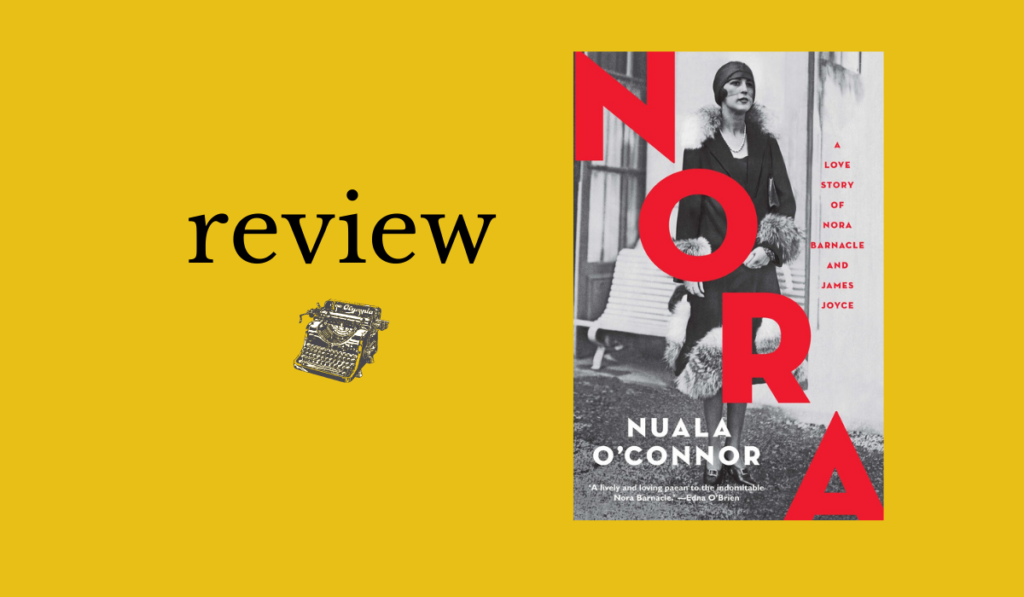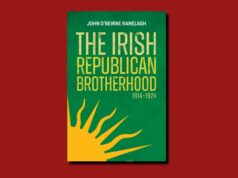
Nora|Nuala O’Connor|New Island|Paperback €16.95|ISBN: 9781848407893
by Laura King
The subtitle “A Love Story” is apt in a number of ways when describing Nora by Nuala O’Connor; it’s clear from the opening pages that this is a work of great love.
The novel details the now famous romance between Nora Barnacle and James Joyce, breathing life and passion into historical figures that we think we already know, creatively building around careful historical research to give insight into the private life of such an influential couple.
Familial love, romantic love, lust and a love for literature and art are at the centre of Nora—but the most striking thing about the novel is the reverence and understanding with which Nuala O’Connor treats her central character. Her ability to capture the spirit of her subject is so wonderful that Nora’s hopes are the reader’s hopes, and her fears and frustrations are our fears and frustrations too.
O’Connor’s careful study of Joyce’s writing and the couple’s biography combined with her wonderful imagination creates a convincing, distinctive and compelling voice for Nora that becomes the beating heart of the work.
We meet Nora after she’s first stepped out with Joyce, or Jim as she calls him, her ambitious, sweet talking rascal who has great plans to take her away from a country that offers them nothing. She is disappointed when Jim won’t marry her, disappointed again when they only pass through Paris instead of staying there as she had hoped, and is disappointed many times by Jim’s schemes that amount to nothing, or by work that falls through, or when he breaks his promises and drinks the money that should have gone towards their room and board.
In these moments, it’s easy for the reader, too, to get angry on Nora’s behalf, as though he is the no-good husband of a dear friend, not a legendary writer. However we also feel so proud when he finally is published and begins to win the praise and acclaim of his peers. But, Nora is no pushover; she is brave, resourceful and grounded. She makes a home out of every chaotic environment Jim presents her with, and wins over people wherever she goes.
I found her bemusement at his writing, so revered by many, very funny throughout the novel and this added a humour and fond irreverence to not only their relationship but also to Joyce’s legacy, which stops O’Connor’s portrait from being overly earnest. The proclamation of the ability to ‘travel though books’ can be a little over stated, but through Nora’s soaking up of and vivid descriptions of her surroundings, I was transported to Paris, Trieste, and Zurich as the family bounced around Europe, always chasing after Joyce’s latest idea or scheme, never with much of a plan or a support system, but always with Nora’s love, loyalty and courage at the core.
Nuala O’Connor’s writing is fresh and joyful, with short, diaristic chapters that make it easy to dip in and out.
While O’Connor certainly invented the circumstances around her characters for the purpose of her narrative, her research was undoubtedly extensive to allow her to paint such a vibrant picture.
This research also informed the creation of Nora’s voice, which is the most impressive element of the book. If O’Connor had written the story from Joyce’s point of view, it may have been an easier task as there would be a lot of material to mimic. However, as O’Connor discussed in her recent essay for The Paris Review, Nora’s letters to Jim were lost, so we don’t know what she sounded like. All O’Connor had for inspiration was the gap, or the absence in Joyce’s famous letters to her—but she uses this source material to brilliantly create Nora’s voice from that absence.
It struck me from the first page how distinctive Nora’s voice is, the Galway lilt meeting particular phrases and types of descriptions, beautiful and almost vulgar at once, which I would associate with Joyce’s earlier or perhaps more straightforward writing. Some of the rhythms or cadences of the narrative voice change gradually over the course of the novel, which could be attributed to how the family learned and adopted various languages into their everyday speech.
Likewise, earlier in the book Nora and Jim are ravenous for love and adventure, and are determined to carve out their place in the world, though as the story goes on they become more settled and comfortable. The pace of the novel reflects the changes in Nora’s life; the reader feels them instinctively. I felt that the book slowed down quite a bit when the focus of the novel shifted to Georgio and Lucia Joyce, but having said that, if O’Connor’s aim is to give a full picture of Nora’s life after her meeting Jim it would be wrong to leave out the adult lives of her children, who themselves were such interesting people.
Nora perfectly captures the excitement of the ‘20s and ‘30s, the modernist movement and its innovation, but also the displacement and danger that came with the Second World War.
It offers such a joyful reading experience even though many elements of the novel are sad, such as the troubled lives of Giorgio and Lucia, and Nora and Jim’s disheartened, disillusioned though always wistful relationship with Ireland.
O’Connor conjures her heroine from between the lines of Joyce’s letters, making Nora speak back to him and to us, not as the shadow or muse of a great man but as a woman reimagined and reintroduced as her own, full person. This is an incredible portrait of Nora Barnacle that is firmly rooted in fact with clearly careful research—but it also demonstrates the passionate, imaginative writing I have come to associate with Nuala O’Connor.

Laura King works in publishing in Dublin, and in her spare time reviews books online under the name @lauraeatsbooks












